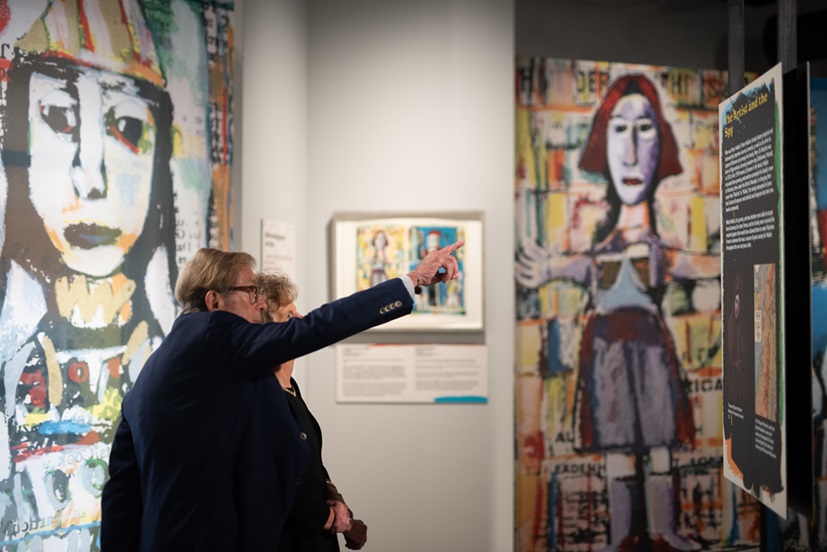The opinion piece originally appeared in the St. Louis Post-Dispatch (November 15, 2024)
Carol Staenberg & Myron Freedman
Across the spectrum of political messages heard and seen in recent campaigns and demonstrations around the world, we have witnessed a dramatic rise in disinformation, dehumanizing rhetoric, and pernicious othering — language that suggests a backsliding away from tolerance and acceptance and towards an all-too-familiar hatred that the world, since the Holocaust, seemed intent on vanquishing.
Because such rhetoric echoes the historic period surrounding the Nazi rise to power, the community often looks to us at the St. Louis Kaplan Feldman Holocaust Museum for guidance, especially in the post-2024 election atmosphere.
Times like these are what the Museum was built for.
It is understandable that some will have concerns about the specters of the past. Rising rates of antisemitism and all forms of hate are frightening — yet we should lean into our apprehension by asking questions. Though the Museum focuses on the history of the Holocaust, the lessons drawn from the most brutal event known to humankind are universal.
We examine how history can illuminate the present without simplifying or flattening the narrative of the past. At the Museum, we strive to make connections, not comparisons.
The difference between connecting and comparing is subtle but important. Direct comparisons risk diminishing the unique and horrific realities of the Holocaust and reduce the specific warnings history can offer. Making connections between past events and current trends enables us to identify dangerous patterns before they take deeper root.
This understanding is more urgent than ever, as we can no longer look solely beyond our borders for the threat of rising hate and polarization.
Lessons from the Holocaust stand out with pressing relevance today:
The fragility of democracy and the distrust of institutions The Holocaust shows us that democracy requires constant care. The erosion of democratic principles allowed authoritarianism to thrive in Germany. Jan. 6, 2021, was a stark reminder of democracy’s vulnerability.
The Weimar Republic similarly suffered from political instability, economic turmoil, and weakening institutions, which paved the way for authoritarianism. Democracy relies on our active participation to defend it from those who seek to exploit its weaknesses.
The power of dehumanizing language The Nazis dehumanized “the other” effectively, paving the way for genocide. We see echoes of this today when groups are scapegoated, belittled, or treated as less than human. We must recognize that language has the power to divide and destroy — and push back against it.
The danger of propaganda and misinformation The Nazis weaponized media to spread lies and foster hatred, creating a cultural climate that made violence possible. Today’s digital age accelerates the spread of misinformation, creating polarized communities and information silos. We need to build resilience against these tactics by cultivating critical media literacy and questioning false narratives that threaten to divide us.
The role of individuals in combatting hate The Holocaust was fueled by individuals who took part in or allowed hatred to grow. History also teaches us that one person can make a difference. Acts of kindness, allyship, and courage can challenge and dismantle hate. The Museum emphasizes that each of us has the power and responsibility to counter bigotry and build a more compassionate world.
Our Holocaust survivors remind us of our collective responsibility. They have dedicated their lives to sharing their stories so that future generations can learn from them. They urge us not only to remember but to act. The Museum exists not merely to memorialize the past but to help our community recognize the warning signs of hate and to respond.
This is why we must listen closely to the lessons of the Holocaust. When we allow prejudice, dehumanization, and misinformation to go unchecked, we lay the groundwork for dangerous escalation. But when we recognize these signs, we can respond with clarity and resolve.
At the St. Louis Kaplan Feldman Holocaust Museum, we are more than custodians of the past. We are architects of a better future. If we stopped our education with the liberation of the camps and the end of the war in 1945, we would fail in our mission. Instead, we look to history as a guide to strengthen our present and shape a more just future.
This is our commitment to our community and the world: to educate, to remember, and to act. Together, we can ensure that the lessons of the past inspire us to build a world where hate has no home.
Staenberg is board chair and Freedman is executive director for the St. Louis Kaplan Feldman Holocaust Museum.



I shared this with several people who would be very helpful